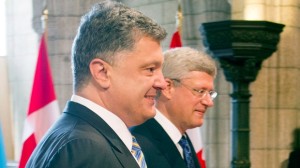
Ottawa, As Ukrainian President Petro Poroshenko arrived Wednesday on Parliament Hill to address MPs and senators, another visiting European official lauded Ukraine’s recent move to pull away from Russian influence.
Prime Minister Stephen Harper and Poroshenko, the former candy billionaire, exchanged warm greetings and affirmed their mutual solidarity and support after Poroshenko received a red-carpet welcome to the Centre Block.
“I know it’s a very difficult time and we’re greatly honoured that you were able to share this time with us on your visit to North America and to give us the opportunity to express our support for your government,” Harper said during a photo opportunity in his office.
Speaking in English, Poroshenko lauded Canada for its unwavering support of Ukraine — not just in the recent months of crisis, but over the years as well.
“Canada is one of the very closest partners to Ukraine. We still remember that Canada was the second country after Poland to recognize our independence,” Poroshenko said.
“Canada is the most Ukrainian country outside Ukraine.”
There are about 1.2 million Ukrainian Canadians and they form a powerful voting bloc in some key Toronto ridings, as well as in communities across the Prairies.
Earlier this week, Poroshenko signed a co-operation agreement with the European Union that will deepen economic and political ties and help cement Ukraine’s focus towards Europe and away from Russia.
It was a decision last fall by former president Viktor Yanukovych to abandon an EU co-operation pact in favour of closer ties with Russia that sparked the popular uprising and plunged Ukraine into months of turmoil.
About 3,000 people have been killed, leaving the West and Russia — with Ukraine caught in the middle — mired in their worst crisis since the end of the Cold War.
EU member Denmark welcomed the arrival of the new pact with Ukraine, and said more sanctions against Russia could be in offing.
“Ukraine, with this, sends a clear signal that they belong to Europe and they want a strong relation with the European Union,” Danish Trade Minister Mogens Jensen told The Canadian Press during a separate visit to Ottawa on Wednesday.
“We are strongly opposing Russia’s approach and we have, together with Canada, strongly supported the sanctions that have been put upon Russia.
“Even a new regime of sanctions is to come.”
Jensen said Europe and the world must send “a strong signal to Russia because they are endangering not only eastern Europe but world peace by having such an aggressive approach to neighbouring countries.”
Poroshenko arrived in Ottawa on Tuesday night, hours after Ukraine agreed to grant greater autonomy to rebel-held parts of the country’s east.
A nearly two-week-old cease fire is holding in Ukraine, but tension continues between government forces and Russian-backed rebels in the east. A building in Donetsk was hit by rocket fire Wednesday, killing at least one person.
Harper has been a staunch ally of Ukraine and was the first world leader to visit Poroshenko in Kyiv in June, shortly after he was elected.
The Harper government has also been a fierce critic of Russian President Vladimir Putin, joining an international sanctions effort. Harper has blamed Putin personally for threatening world peace by provoking the unrest in eastern Ukraine and annexing the Crimean peninsula.
NDP Leader Tom Mulcair praised Poroshenko for his “strong leadership” in trying to ratchet down the tension in his country.
But he criticized Canada for not yet coming through with a $200-million loan guarantee to Ukraine that was announced this winter.
“Canada, as usual, talks a good game — but the money hasn’t flowed.”
On Tuesday, Canada announced more sanctions and travel bans aimed at ratcheting up the pressure on Putin.
Foreign Affairs Minister John Baird also announced that Canada will send 200 election observers and a dozen members of Parliament to Ukraine next month to help monitor parliamentary elections.
Earlier this week, the Canadian Group for Democracy in Ukraine sent an open letter to Harper asking him to send military assistance to the country.
So far, neither Canada nor other NATO members have supplied any military aid to Ukraine.




 Driving Naari Programme launched in Chandigarh
Driving Naari Programme launched in Chandigarh






























